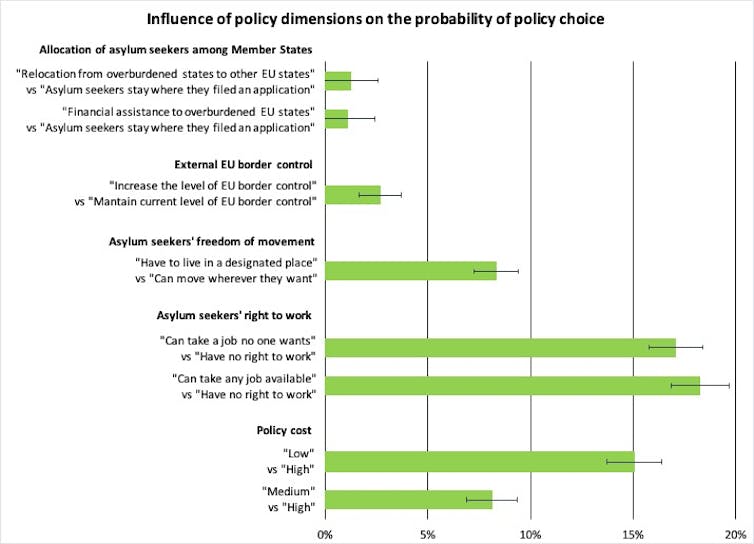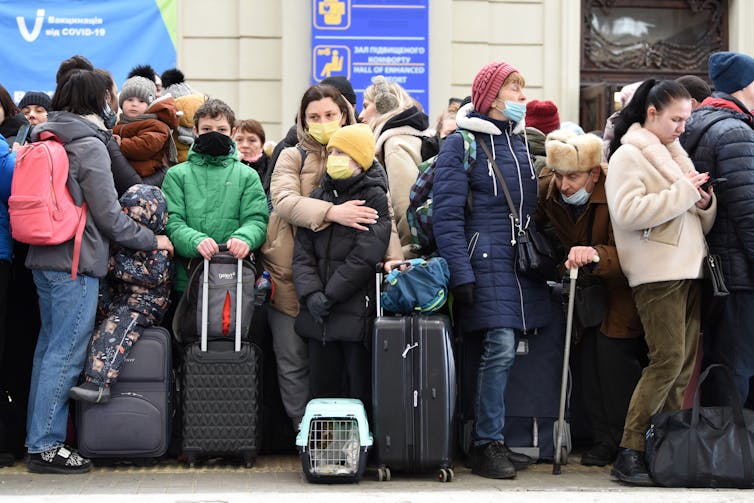The issues of migration and asylum are contentious in Europe, and have caused deep rifts among EU member states for years. These topics are fully on the agenda for the 2024 EU elections. Political parties have taken radically different stances, from proposing to triple the number of staff at Frontex, the EU’s border agency, to dissolving it entirely.
In April, the European parliament passed its pact on migration and asylum, an overhaul of its migration policies nearly a decade in the making. The pact aims to improve immigration and control and asylum policy at the EU’s external borders, and make it easier to return failed applicants to their countries of origin.
It also introduces a number of “solidarity measures”, whereby less burdened nations have to offer support to those receiving a higher load of asylum applications. Finally, it allows asylum applicants to take up paid employment if they are waiting longer than six months for a decision on their application. But critics say it undermines asylum seekers’ human rights by limiting their right to appeal.
Meanwhile, the Polish and Hungarian governments have voted against the pact and declared that they will not ratify it. Both countries and the Czech Republic breached EU law in 2015 by refusing to accept asylum seekers relocated from other member states.
But, according to our recent research, European citizens are not as polarised on this issue as their governments. Across member states, people have remarkably similar preferences, including being strongly in favour of asylum seekers being allowed to work.
We surveyed a total of 18,176 people in ten EU member states (Poland, Hungary, Croatia, Slovenia, Bulgaria, Denmark, Germany, Austria, Spain and Portugal) about what they expect from migration and asylum policy.
We asked for opinions on a number of elements: control of external EU borders, allocation of asylum applicants among member states, freedom of movement, right to work and the policy cost for the average taxpayer. Respondents were asked multiple times to choose between two different policy packages, in which we randomly varied these aspects.
Respondents were around 17%-18% more likely to choose a policy with either of the options allowing access to the labour market, over a policy with “no right to work”. However, they were not supportive of asylum seekers’ freedom of movement and would prefer them to live in a designated place (respondents were 8.3% more likely to choose the latter option over the former).
Unsurprisingly, we found that most people would like a policy to be inexpensive (respondents were 15% more likely to choose this option over an expensive policy). And, while they would welcome increased protection at EU external borders, this was not of primary importance.
These preferences were shared by citizens surveyed across all nations, regardless of their age, gender or level of education.
Likelihood of respondents choosing a policy with one option over the other:

Citizens of countries that have experienced a large influx of asylum applicants in the past (Germany, Spain, Austria, Portugal) would like to be able to relocate new applicants to less burdened countries. For those in other countries, the issue of allocation of asylum applicants among member states is only marginally important – people are generally more concerned with domestic policy than EU-wide solutions.
Effect of war in Ukraine
We collected data just before the outbreak of the war in Ukraine and followed up in Poland, Hungary and Germany immediately after. We wanted to know whether the strain related to the sudden presence of millions of war refugees changed people’s expectations on asylum policy in the most affected countries.
Within weeks of the Russian invasion, over 6 million Ukrainian refugees crossed into the EU. They were greeted with a massive wave of support and offered special temporary protection allowing them to take up employment and relocate freely within the EU.
Yet, receiving societies experienced considerable strain, with a radically increased demand for social services and growing labour market competition. On the other hand, the proximity of war and cultural similarity of refugees to EU citizens might have made them generally more open towards asylum seekers.

Research looking at preferences for different types of immigrants has shown little to no change in general stance towards refugees and asylum seekers among the European public following the Russian invasion of Ukraine.
We re-interviewed respondents in Germany, Poland and Hungary – countries most exposed to the influx of refugees from Ukraine in our original study – to see whether the war led them to change their preferences. Interestingly, we found that it made Polish and Hungarian citizens even more willing to grant asylum seekers access to the labour market, and slightly more open towards their freedom of movement.
While governments may remain divided over these issues, our findings show that European citizens are largely in agreement, supporting a policy of cautious hospitality. This gives us hope that the issue of migration can move from dividing to uniting Europe, and the EU can enact a migration policy that lives up to its values. However, for this to happen, politicians across the EU will have to listen to their voters.

